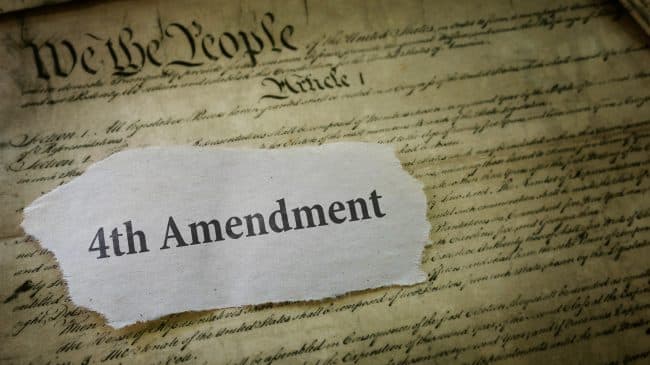No. 18-1173
Supreme Court of the United States
I.B. AND JANE DOE, v.
Petitioners, APRIL WOODARD, et al.,
On Petition for a Writ of Certiorari to the United States Court of Appeals for the Tenth Circuit
Brief of cross-ideological groups dedicated to ensuring official accountability, restoring the public’s trust in law enforcement, and promoting the rule of law as amici curiae in support of petitioner
Summary of Argument
“The government of the United States has been emphatically termed a government of laws, and not of men.” Marbury v. Madison, 5 U.S. (1 Cranch) 137, 163 (1803). But as Chief Justice Marshall admonished, our government “will certainly cease to deserve this high appellation, if the laws furnish no remedy for the violation of a vested legal right.” Id. Few principles run as deep in the American legal tradition. Yet the doctrine of qualified immunity finds itself increasingly out of step with Chief Justice Marshall’s formulation, and it does so at a perilous time.
Public trust in our government institutions has fallen to record lows. A rash of high-profile, sanction-free incidents of police misconduct has sent Americans to the streets in protest. Law- enforcement officers, in turn, report serious concerns about their ability to safely and effectively discharge their duties without the confidence of those they must protect. Entire cities are now synonymous with this vicious cycle—Ferguson, Baltimore, Dallas, Chicago.
Law-enforcement officers are often the face of the public’s lost trust, but as the shocking facts here throw into sharp relief, qualified immunity shields a wide range of official misconduct. If the Tenth Circuit’s decision stands, Petitioners will have no recourse against a state official tasked with promoting child welfare who decided, without a warrant, to strip-search and photograph the most intimate body parts of a four-year-old girl at her Head Start preschool program—despite plain-view evidence inconsistent with unfounded allegations of abuse—and who later lied about what happened to the child’s mother. This egregious misconduct surely violates clearly established law. Yet the Tenth Circuit held otherwise.
Amici reflect an extensive cross-ideological and cross-professional consensus that this Court’s qualified immunity case law undermines accountability, harming citizens and public officials alike. The diversity of the signatories reflects how qualified immunity abets and exacerbates the violation of constitutional rights of every sort—including the rights to freedom of speech and religious exercise, to keep and bear arms, to be free from unreasonable searches and seizures, to be free from cruel and unusual punishment, to be free from racial discrimination, and to pursue a lawful occupation, just to name a few.
A civil action under 42 U.S.C. § 1983 is often the only way for a victim of official misconduct to vindicate these federally guaranteed rights. But qualified immunity often bars even those plaintiffs who can prove their case from remedying a wrong: harm, but no foul. Qualified immunity thus enables public officials who violate federal law to sidestep their legal obligations to the victims of their misconduct. In so doing, the doctrine corrodes the public’s trust in those officials—law enforcement in particular— making on-the-ground policing more difficult and dangerous for all officers, including that vast majority who endeavor to uphold their constitutional obligations. And the doctrine’s primary justification, to prevent public officials from paying their own judgments, has proven empirically unfounded as the widespread availability of indemnification already provides that protection.
Neither the text nor the history of Section 1983 compels this perverse outcome. See, e.g., William Baude, Is Qualified Immunity Unlawful?, 106 Cal. L. Rev. 45 (2018). The text of Section 1983 says nothing about immunity, qualified or otherwise. The common law that existed when Congress passed Section 1983 as part of the 1871 Ku Klux Act did not provide for anything like the sweeping defense that qualified immunity has become. Id. at 55–61. Members of this Court have recognized as much. See Ziglar v. Abbasi, 137 S. Ct. 1843, 1871 (2017) (Thomas, J., concurring in part and concurring in the judgment) (“In further elaborating the doctrine of qualified immunity * * * we have diverged from the historical inquiry mandated by the statute.”); Wyatt v. Cole, 504 U.S. 158, 170 (1992) (Kennedy, J., concurring) (“In the context of qualified immunity * * * we have diverged to a substantial degree from the historical standards.”); see also Kisela v. Hughes, 138 S. Ct. 1148, 1162 (2018) (Sotomayor, J., dissenting) (the Court’s “one-sided approach to qualified immunity” has “transform[ed] the doctrine into an absolute shield for law enforcement officers, gutting the deterrent effect of the Fourth Amendment”).
This brief will not retread these textual and historical arguments, which are discussed at length elsewhere. See, e.g., Pet. 25–29; Baude, supra. Instead, this brief recognizes that “[a]lthough [the Court] approach[es] the reconsideration of [its] decisions with the utmost caution, stare decisis is not an inexorable command,” South Dakota v. Wayfair, Inc., 138 S. Ct. 2080, 2096 (2018) (quoting Pearson v. Callahan, 555 U.S. 223, 233 (2009)), and thus engages the “real world implementation” of a doctrine that was already “wrong on its own terms when it was decided,” see id. at 2097.
Qualified immunity denies justice to victims of unconstitutional misconduct. It imposes cost-prohibitive burdens on civil-rights litigants. And it harms the very public officials it seeks to protect. In short, our nation’s experience with qualified immunity “has made [the Court’s] earlier error all the more egregious and harmful.”
